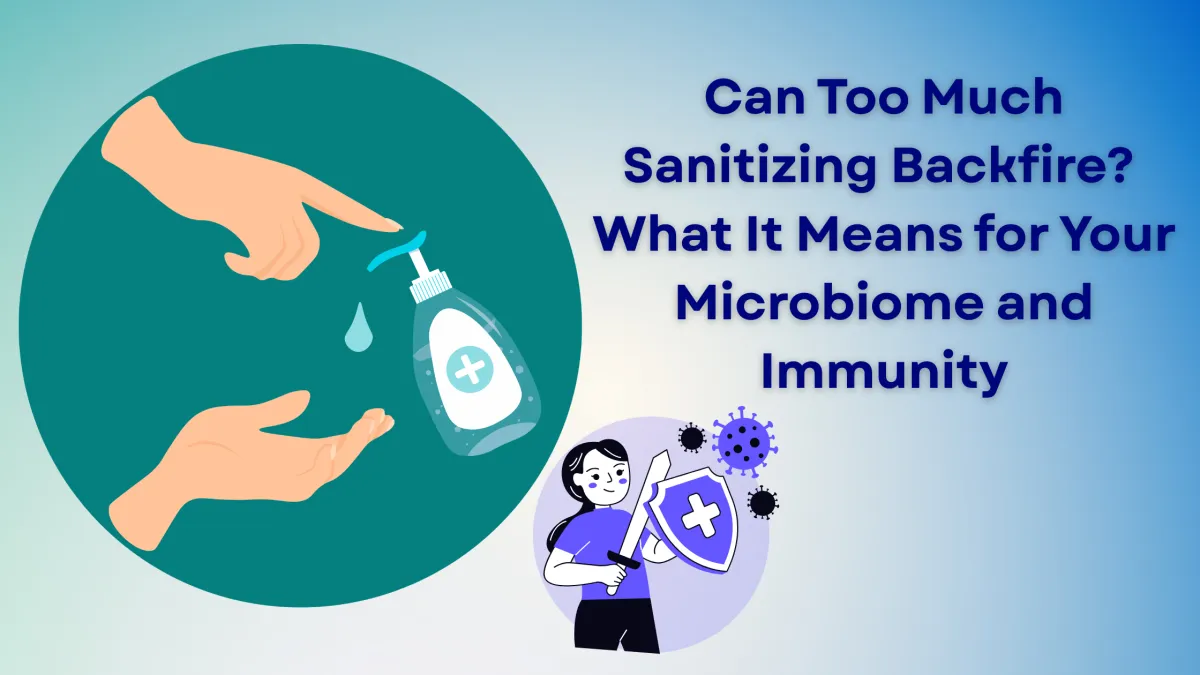
Is Over-Sanitizing Weakening Your Immune System? Here’s What You Should Know About Your Microbiome
In recent years, we’ve been encouraged to scrub, spray, and sanitize like our health depends on it—and in some cases, it does. But what if all those antibacterial soaps, sanitizing gels, and disinfectant wipes are doing more harm than good? When I was in my surgical training, all the scrubs and antiseptics we used on our hands tore up my skin to the point that I used to have to sleep with steroid cream and cotton gloves on, so I'm very familiar with this problem.
It may seem counterintuitive, but emerging research shows that going overboard with sanitizers can disrupt something critical to your health: your body’s microbiome. And that disruption can have lasting effects on your immune system.
What Does Your Microbiome Have to Do With Immunity?
Your microbiome is the complex community of bacteria, fungi, and even viruses that live in and on your body—especially your skin and gut. While we've been taught to fear germs, the truth is that many of these microbes are incredibly beneficial. They help:
Train your immune system
Regulate inflammation
Protect against harmful pathogens
Support digestion, mood, and even metabolism
When we repeatedly use harsh antibacterial products—especially those with chemicals like triclosan or high levels of alcohol—we not only kill off harmful bacteria but also eliminate the beneficial microbes that help keep us healthy. Over time, this can throw your microbial ecosystem out of balance.
How an Imbalanced Microbiome Impacts Immunity
A diverse, balanced microbiome is essential for teaching your immune system how to function properly. Beneficial microbes help immune cells recognize the difference between friendly organisms and dangerous invaders.
When that balance is lost, your immune system can go haywire:
Overreacting (resulting in allergies, eczema, or autoimmune flares)
Underreacting (leaving you more vulnerable to infections)
This is part of what scientists call the hygiene hypothesis—the idea that reduced exposure to microbes, especially in early life, may actually increase the risk of chronic inflammatory conditions like asthma, eczema, and even inflammatory bowel diseases.
Signs Your Microbiome Might Be Out of Balance
Wondering if your sanitizing habits may be affecting your microbial health? Here are some common signs:
More frequent infections or slower recovery from illnesses
Digestive issues like bloating, constipation, or diarrhea
Skin problems such as rashes, eczema, or dryness
Increased seasonal allergies or new food sensitivities
Low energy or a general sense of feeling “off”
While these symptoms can have many causes, they’re often red flags that your microbiome may need support.
How to Support Your Microbiome (Without Skipping Hygiene)
You don’t have to give up cleanliness to protect your microbiome—just be more mindful of your approach. Try these practical steps:
✔ Choose Gentle Over Harsh
Stick with mild soap and warm water for routine handwashing. Avoid antibacterial soaps and heavily scented products containing triclosan or other harsh disinfectants unless absolutely necessary.
✔ Don’t Overuse Hand Sanitizer
Alcohol-based sanitizers are useful in certain situations, like when you're out and about, but using them constantly—especially at home—can damage the skin’s barrier and beneficial microbes.
✔ Nourish Your Gut Daily
Eat a fiber-rich diet filled with colorful vegetables, fruits, legumes, nuts, and seeds. Add fermented foods like yogurt, sauerkraut, kimchi, or kefir for natural probiotic support.
✔ Spend Time in Nature
Gardening, walking barefoot, playing with pets—these simple activities expose you to a wider range of microbes, which can strengthen immune tolerance and resilience.
✔ Consider Targeted Probiotics
If you’ve been using lots of sanitizers or recently taken antibiotics, a well-chosen probiotic may help restore balance. Talk to a practitioner about the right strains and dosage for you.
When to Work With a Practitioner
If you’re dealing with persistent infections, digestive struggles, skin issues, or unexplained fatigue, it might be time to take a closer look at your microbiome. Functional testing can provide deep insights, such as:
Comprehensive stool analysis to assess bacterial balance, pathogens, digestion, and inflammation
Secretory IgA testing to evaluate your gut’s immune barrier
Zonulin and food sensitivity testing if leaky gut is suspected
Micronutrient testing to uncover deficiencies that could be straining your immune system
With this kind of information, you can move beyond guesswork and begin a personalized healing plan—whether it includes targeted probiotics, herbal antimicrobials, gut-repair protocols, or simple nutritional shifts.
The Bottom Line
Sanitizing products certainly have their place—especially in medical settings or when preventing the spread of illness. But at home, overuse can undermine the very microbial allies that help keep your immune system strong.
Supporting your microbiome is one of the smartest ways to support your whole-body health. With a few mindful changes, you can build a more resilient, better-trained immune system that’s ready for whatever comes your way.
Need help getting started? We're here to guide you.
One Click Closer to Wellness – Book Now
References
Bloomfield SF, Stanwell-Smith R, Crevel RW, Pickup J. Too clean, or not too clean: the hygiene hypothesis and home hygiene. Clin Exp Allergy. 2006 Apr;36(4):402-25. doi: 10.1111/j.1365-2222.2006.02463.x. PMID: 16630145; PMCID: PMC1448690.
Rivera-Amill V. The Human Microbiome and the Immune System: An Ever Evolving Understanding. J Clin Cell Immunol. 2014 Dec;5(6):e114. doi: 10.4172/2155-9899.1000e114. Epub 2014 Nov 5. PMID: 27088046; PMCID: PMC4831629.
Rocha LA, Ferreira de Almeida E Borges L, Gontijo Filho PP. Changes in hands microbiota associated with skin damage because of hand hygiene procedures on the health care workers. Am J Infect Control. 2009 Mar;37(2):155-9. doi: 10.1016/j.ajic.2008.04.251. PMID: 19249642.
Haahtela T, Holgate S, Pawankar R, Akdis CA, Benjaponpitak S, Caraballo L, Demain J, Portnoy J, von Hertzen L; WAO Special Committee on Climate Change and Biodiversity. The biodiversity hypothesis and allergic disease: world allergy organization position statement. World Allergy Organ J. 2013 Jan 31;6(1):3. doi: 10.1186/1939-4551-6-3. PMID: 23663440; PMCID: PMC3646540.
